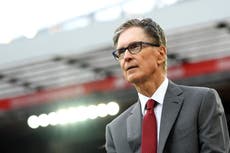David Bernstein and Gary Neville demand reform of ‘ineffective’ FA in radical football governance proposal
Eight-person group have released the ‘Saving the Beautiful Game’ manifesto calling for independent regulation and statutory powers to be introduced to create a sustainable and healthy football framework
Former FA chairman David Bernstein has called for “essential governance reforms” at the Football Association because the governing body is not fit for purpose.
Bernstein, who served as FA chairman between January 2011 and May 2013, is among eight prominent figures from various backgrounds, including the mayor of Greater Manchester Andy Burnham, former FA executive director David Davies and ex-England footballer Gary Neville, who have unveiled the ‘Saving the Beautiful Game’ manifesto that aims to restructure English football in order to create a sustainable and healthy future.
The group, which is completed by former sport minister and MP Helen Grant, the former governor of the Bank of England and Aston Villa director Mervyn King, Olympic gold medalist and sports broadcaster Denise Lewis, and sports lawyer Greg Scott, unveiled their proposal that is designed to save English football from financial ruin by installing an “independent regulator or commissioner”, with the support of statutory powers from the government.
It is aimed at tackling the financial disparity and unsustainability across the English pyramid, a power structure that is fundamentally out of balance, and “a range of consequential matters including the embarrassing shortage of Black, Asian and Minority Ethnic coaches and managers at the top level”, along with the exploitation of clubs and fans.
It stems from eight months’ research and addresses a Football Association that is “comprehensively financially outmuscled” by the Premier League, which in 2018/19 attracted revenues that were 12-times the FA’s, and hopes to draw up a revolutionary framework that will provide “greater distribution to the wider game”.
The report states that “the FA lacks credibility and has proved to be largely ineffective as a governing body,” and “has not modernised and is not sufficiently independent”.
It adds: “The FA has been resistant to serious change, including in its approach to diversity and well-illustrated by the woefully unrepresentative makeup of the FA Council.
The announcement comes after the Premier League voted down Project Big Picture, a proposal led by Liverpool, Manchester United and English Football League chairman Rick Parry that Neville said “required negotiation (as) there is too much good in this plan to dismiss it”.
The Premier League distributed £400m in parachute and solidarity payments and grants last season, compared to £165m from the FA. However, their £5.6bn revenue – driven largely from the league’s £3.5bn broadcasting deal – vastly outweigh the £785m income of the Championship and £282m across the third and fourth tiers of English football combined. More worryingly, the net debt across the top four divisions in the country exceeds £5bn.
Project Big Picture was also shot down by the FA, with chairman Greg Clarke writing to the FA Council this week to confirm he removed himself from the behind-closed-doors talks when a breakaway was threatened by the Premier League’s elite clubs. That has since been called into question by the revelation from Parry that it was Clarke “who initiated this process” and raised the possible introduction of “Premier League Two, B Teams and the exclusion of League One and League Two clubs from the Elite Player Performance Programme”.
The manifesto calls on Parliament to introduce legislation to bring about radical reform, with one of seven proposals being “a fundamental reform of the FA Council” as the first port of call for the national governing body, which it says has failed to implement an independent, diverse and representative body of what English football looks like in 2020.
The seven-point proposal calls on a new body to:
- Be independent of the current structure of the game.
- Decide on new ways of distributing funds to the wider game based on a funding formula and a fair levy payable by the EPL.
- Set up a new and comprehensive licencing system for the professional game.
- Review causes of financial stress in the EFL including parachute payments, solidarity payments, salary caps and mandatory relegation clauses in players’ contracts.
- Implement governance reforms at the FA which are essential to ensure it is truly independent, diverse and representative of English football today. A fundamental reform of The FA Council would be an impressive start of this process.
- Liaise with supporters’ organisations to progress issues that are of concern to fans and provide a greater voice for supporters.
- Study lessons from abroad and seek to champion supporter involvement in the running of clubs.
The new regulatory body would be appointed and held accountable by the government, albeit one that is funded by football itself and not the taxpayer, with a plea for actual reform of the game following a decade of baseless threats. Since July 2011, numerous calls for reform have failed to have any impact on the sport, but the 2019/20 financial crisis – which has seen the demise of Bury FC and Macclesfield Town – and the absence of matchday revenue due to the coronavirus pandemic has seen desperate calls for urgent action to be taken.
The group have picked apart successful models in other countries, with the Bundesliga’s licencing model hailed as a successful way to maintain financial safety while giving supporters a greater stake in the governance of their clubs. Lessons learned from Germany and France also show how legislation can be introduced to football for the greater good to help improve fair competition without falling foul of Fifa’s requirement to avoid government intervention.
The franchise model in the United States was also reviewed, with its use of a ‘commissioner’ across all major sports raising the potential to introduce an overseeing figure in football to ensure sustainable and responsible financial management and governance.
Join our commenting forum
Join thought-provoking conversations, follow other Independent readers and see their replies
Comments


Bookmark popover
Removed from bookmarks